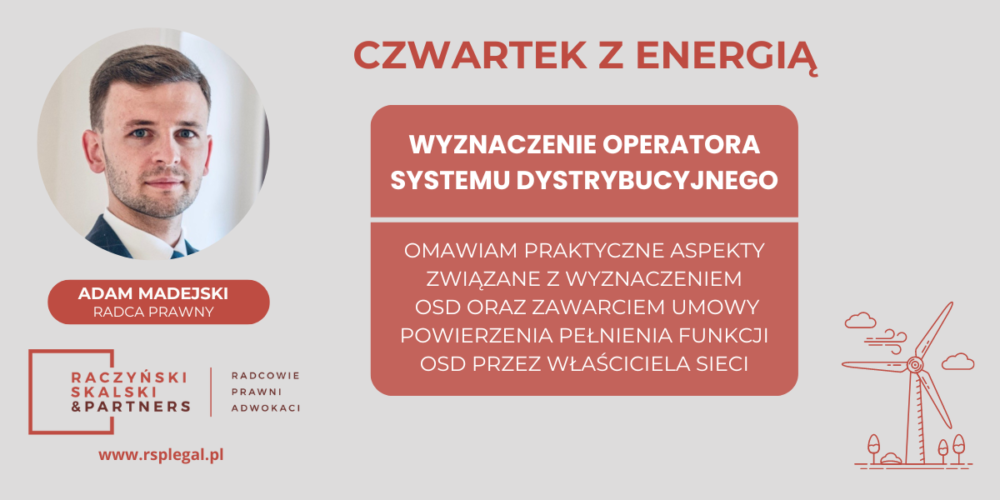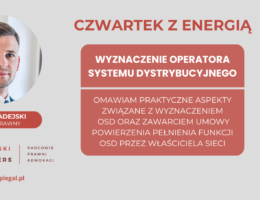In Poland, areas formerly occupied by manufacturing plants are increasingly being used and so-called commercial and industrial parks are being created. By their very nature, these are places where the power grid is extended, and the number of its customers can be dozens or even hundreds of entities. In such a situation, it is worth considering whether to separate the network as a separate distribution system, which for the owner of the network can be a source of additional revenue, but also obligations.
1. Distribution system operator
Any part of the power grid that is not an internal installation of the end customer should be under the management of a distribution or transmission system operator. While there is only one transmission system operator in Poland, there are at least dozens of active distribution systems in Poland. Sometimes the management of an extensive internal installation requires the involvement of not only significant financial and technical resources, but also the employment of specialized personnel. The owner of such a network may consider applying to the President of the Regulatory Authority for designation as an electricity system operator within the owned network under Article 9h(1) of the Energy Law. The designation is made on the basis of an administrative decision, for a specified period of time, which indicates the operator’s area of operation and the components of the network under its authority. It is also necessary for the owner of the network to have a license to distribute electricity (Article 9h(3)(1) of the Energy Law).
The status of distribution system operator opens the way to the possibility of also operating in the field of electricity generation and trading, which, with a larger scale of operations, can be a significant source of additional revenue. However, one should keep in mind the general principle of prohibition of cross-subsidization, i.e. financing activities carried out under the license with revenues from other activities (Article 44(1) of the Energy Law). Serving as a distribution system operator also involves numerous reporting, informational and technical duties. Billing, metering and ongoing cooperation with DSOp are essential.
For entities that are also a dominant energy consumer within their internal power grid, a solution of the so-called closed distribution system was created, in which some of the operator’s duties were limited (Article 9da (1) of the Energy Law). I wrote more about this solution in this post.
2. Entrusting the function of distribution system operator
It happens that the owner of the network is not interested in assuming the function of distribution system operator, and for practical reasons it would be much more beneficial to create a separate distribution system within the network. In such a case, it is possible to entrust the function of operator to another entity licensed to distribute electricity (Article 9h(3)(2) of the Energy Law). The entrustment is carried out on the basis of a contract, which, in addition to regulating the rules of performing the function of operator, usually involves the lease of the installation itself.
Such a solution is particularly recommended in two cases:
1. the owner of the grid does not have adequate resources to manage the internal power grid or does not want to continue such management,
2. the grid is just being established within a new industrial or economic area, and it is possible to optimize the management of electricity in relations with DSOp and end-users/surface tenants.
3. Practical aspects – entrustment agreement and application for designation
When intending to entrust another entity with the function of distribution system operator, it should be remembered that, according to Article 9h (5) of the Energy Law, the agreement between the network owner and the future operator should at least:
1. indicate the area in which the operator will perform business activities;
2. regulate the rules for the performance of the duties referred to in Article 9c, in particular, the duties assigned to be performed directly by the operator.
Practical considerations also point to the need to regulate:
1. the rules of access to the network, operation, repair, inspection and maintenance,
2. the method of determining remuneration/rent and its possible dependence on the number of connected customers or ordered power,
3. the principles of incurring and settling expenditures on the network in the event of termination of the contract,
4. the principles of responsibility for the condition of the network at the time of takeover from the owner, including hidden and invisible defects,
5. rules for the performance of licensed activities by the operator, in particular in terms of the possible consequences of the termination of contracts concluded with OSDp, violation of the energy law by the operator or loss of the license for electricity distribution,
6. the rules for the conduct of business by the designated operator in the event of a decision by the President of the ERO ordering the continuation of business as an operator under Article 40(1) of the Energy Law and the manner of settlements between the parties during the term of such decision.
It is worth remembering that it is a well-established position that in the case of an intention to entrust the function of DSO by the network owner to another entity, the application for the designation of an operator to the President of the Energy Regulatory Office should be submitted jointly by both parties. Such a conclusion follows directly from Article 9h(1) and Article 9h(3)(2) of the Energy Law. It is worth remembering this nuance, as possible formal irregularities in this regard may unnecessarily prolong the entire process.



